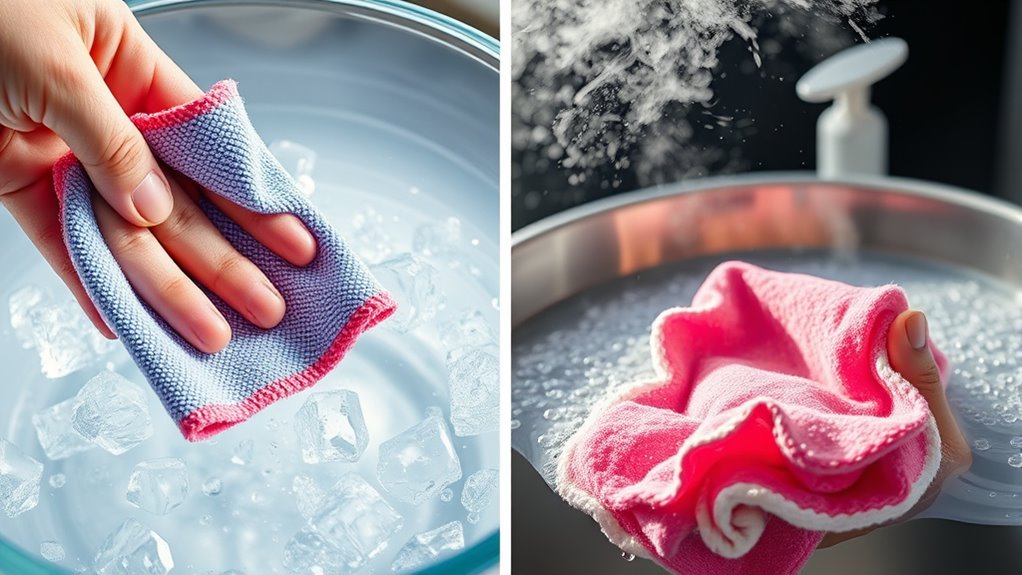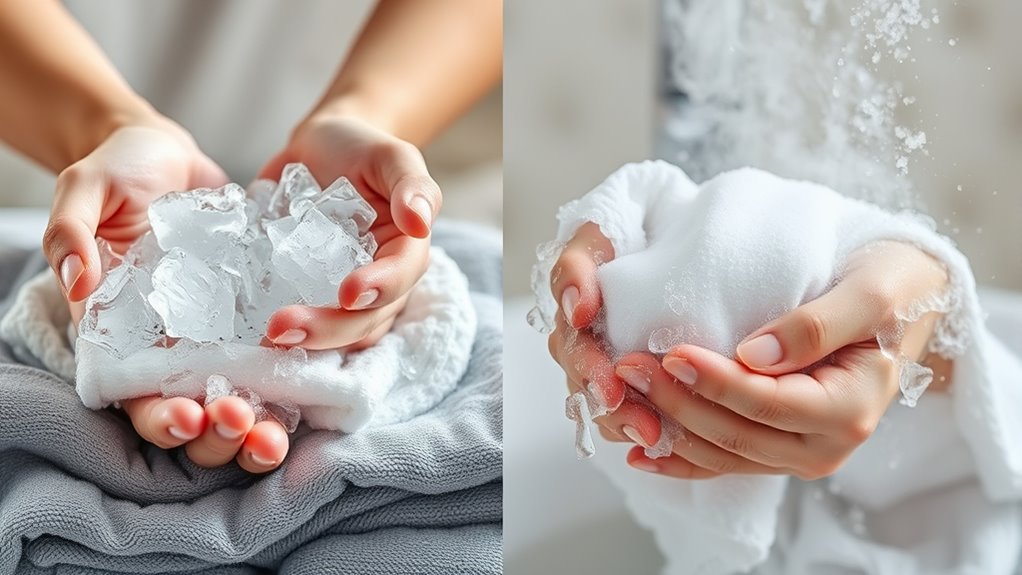Using cold water for cleaning is more eco-friendly because it reduces energy consumption and greenhouse gas emissions. With modern detergents and techniques, cold water can be just as effective for many cleaning tasks, especially routine laundry. Hot water is traditionally seen as better for stain removal, but it uses more energy and wears fabrics faster. To discover how to optimize your cleaning habits while saving energy, explore further information below.
Key Takeaways
- Cold water reduces energy consumption and greenhouse gas emissions, making it more eco-friendly.
- Modern detergents work effectively in cold water, ensuring cleaning efficiency without hot water.
- Using cold water minimizes fabric wear, prolonging item lifespan and reducing waste.
- Hot water is traditionally thought to clean better but isn’t always necessary, especially with effective detergents.
- Cold water use extends appliance lifespan by decreasing heat-related wear and maintenance needs.

When it comes to cleaning, choosing between cold water and hot water can considerably impact the effectiveness of your efforts. Your decision influences not only how well your cleaning tasks turn out but also the energy you use and the environment’s health. Many people assume hot water always provides better results, especially for stain removal, but that’s not always the case. Cold water can be surprisingly effective, especially with the right detergents and techniques. Using cold water helps you save energy because it requires no heating, which directly reduces your utility bills and your carbon footprint. This is particularly advantageous for routine laundry or cleaning tasks where hot water isn’t necessary. It also minimizes wear and tear on fabrics and surfaces, extending their lifespan, which means fewer replacements and less waste. Modern detergents are formulated to work effectively in cold water, meaning you don’t have to sacrifice cleaning power to be eco-friendly. This shift not only benefits the environment but also results in longer-lasting appliances and less wear on your laundry machine, further conserving resources. Additionally, choosing the right water temperature can help you better manage energy consumption**** and promote sustainable cleaning habits.
Frequently Asked Questions
Does Water Temperature Affect Cleaning Time?
Water temperature does affect cleaning time because higher temperatures can boost cleaning efficiency by breaking down grime faster. However, heating water increases energy consumption, making the process less eco-friendly. Cold water may take longer to clean effectively, but it saves energy. You should balance cleaning time and energy use, choosing hot water for tough stains and cold water for lighter cleaning, to optimize both efficiency and sustainability.
Can Cold Water Remove Stubborn Stains Effectively?
Cold water can remove stubborn stains effectively when you choose the right laundry detergents. Modern detergents are formulated to work well in cold water, breaking down stains and lifting dirt without heat. You should pre-treat tough stains and use enzyme-based detergents for best results. While hot water may be more aggressive, cold water is eco-friendly and still capable of stain removal when paired with effective detergents and proper pre-treatment.
Is Hot Water More Energy-Efficient Than Cold Water?
You might think hot water uses more energy, but it’s not always true. Like heating a cup of tea versus boiling a kettle, hot water consumes more energy initially, increasing environmental impact. However, if hot water cleans better, you might save energy by reducing wash cycles. Overall, hot water tends to have higher energy consumption, but the choice depends on cleaning needs and appliance efficiency, affecting both energy use and environmental impact.
How Does Water Temperature Impact Fabric Longevity?
Water temperature impacts fabric longevity by affecting fabric fibers and dye fading. When you use hot water, it can weaken fibers over time, making clothes more prone to tearing. It also accelerates dye fading, causing colors to dull faster. Cold water, on the other hand, is gentler, preserving fabric fibers and vibrant colors longer. So, for better fabric longevity, sticking to cold water is usually the smarter choice.
Are There Items That Should Never Be Washed With Cold Water?
Did you know that over 60% of laundry loads could be washed in cold water? You should never wash delicate fabrics or items with chemical sensitivity in cold water, as they may not get properly cleaned or could be damaged. For these items, hot water helps remove residues and germs effectively, ensuring your clothes stay in good condition and safe to wear. Always check care labels for the best washing instructions.
Conclusion
Choosing cold water for cleaning isn’t just kinder to your energy bill; it’s also gentler on the environment. Imagine a world where your daily chores leave a smaller carbon footprint, like a ripple spreading outward, conserving resources with every wash. While hot water can tackle tough stains, embracing cold water makes you a part of the solution—saving energy, reducing emissions, and helping preserve our planet’s delicate balance. Small changes, like switching your water temperature, can make a big impact.










